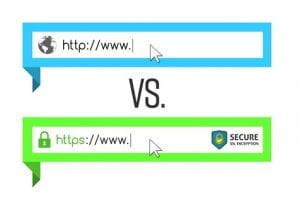What Is the Difference Between HTTP and HTTPS?
What exactly is HTTP?
The Hypertext Transfer Protocol (HTTP) is a set of rules and standards that govern how information is transmitted on the Internet. It enables communication between servers and web browsers.
HTTP is an application layer network protocol constructed on top of TCP, which is one of the primary Internet suite protocols. HTTP employs hypertext structured text to create a logical link between text-containing nodes. Because each command is executed separately without using references to earlier run commands, it is also known as “stateless protocol.”
What is HTTPS, and how does it work?
Hypertext transfer protocol secure (HTTPS), on the other hand, is the next generation of HTTP, offering a more advanced and secure version of these protocols. For data connection, HTTPS uses port 443, which enables safe transactions by encrypting the entire communication via secure sockets layer (SSL). HTTPS is a blend of HTTP and the SSL and Transport Layer Security (TLS) protocols. It allows a network server to be identified in an encrypted and safe manner.

Foxsportsgo Activate Login on Roku Channel, Fire TV, Apple TV and Android with Verification Code
Converting HTTP to HTTPS
Convinced that HTTPS is the right choice for your business’s website? The first step is buying an SSL certificate, which can be purchased through your web hosting provider. You can then install the certificate on your website hosting account. The final steps are setting up a 301 redirect to notify search engines of the change and ensuring that all of your internal links direct to your HTTPS URL.
Advantages and disadvantages of HTTP
If your website uses HTTP, it’s helpful to understand what’s good and bad about HTTP.
Advantages
From a business perspective, HTTP doesn’t offer much value.
Sure, HTTP provides your company online access to people within your target market. Not to mention, it saves you the cost of paying for an SSL certificate each year.
Most website hosting providers provide SSL certificates for free.
Guess what, though? Most businesses receive their SSL certificates for free, thanks to their website hosting providers.
That’s why having an HTTP website is rarely an advantage — instead, it’s a disadvantage.
Disadvantages
The drawback of HTTP goes back to the difference between HTTP and HTTPS: Security.
Whether your company operates online or offline, your website attracts user data. From someone purchasing your product to completing your contact form, you receive personal information that people trust your business to protect.
Almost 85% of people will not buy from unsecure, HTTP websites.
That’s why almost 85% of shoppers will abandon a purchase that sends data, like credit card information, over an unsecure connection. In other words, most people will not buy from unsecure, HTTP websites.
If your company’s site uses HTTP, it’s costing your business sales.
login.yahoo.com/activate on FireStick, Apple, Samsung and Android TV
Advantages and disadvantages of HTTPS
Before your company upgrades to HTTPS, however, it’s helpful to learn about its unique pros and cons.
Advantages
HTTPS offers several benefits, including:
- Secures your website
The core advantage of HTTPS is its ability to secure your site. When you have HTTPS on your website, you encrypt sensitive data and ensure its safe transfer from a user’s device to your business. Essentially, you transport all the data your site collects via an armored car.
- Helps your site appear in search results
HTTPS also helps with search engine optimization (SEO). If you’ve ever looked for your website, services, or products on a search engine like Google, you’ve probably wondered why you weren’t number one. It’s because of SEO.
- Protects your business and your customers
HTTPS also offers the benefit of protecting your company and your customers. Whether your business focuses on generating leads or sales online, you want to safeguard the data of your current and future clients.
- Give your company a powerful trust signal
Padlocks are synonymous with security. That’s why web browsers use the padlock to signify a safe, secure, HTTPS site. It’s also why many shoppers and business buyers look for the padlock when shopping online.
Disadvantages
When it comes to comparing HTTPS vs. HTTP, HTTPS isn’t known for its drawbacks.
Yes, you’ll need to purchase an SSL certificate to move your site from HTTP and secure it, but many businesses receive SSL certificates through their website hosting provider. Even if you have to purchase an SSL certificate, the annual cost is generally a few hundred dollars for a small-to-midsized business.
In comparison, enterprise-level companies may spend upwards of $1500 on an SSL certificate.
Be the first to comment